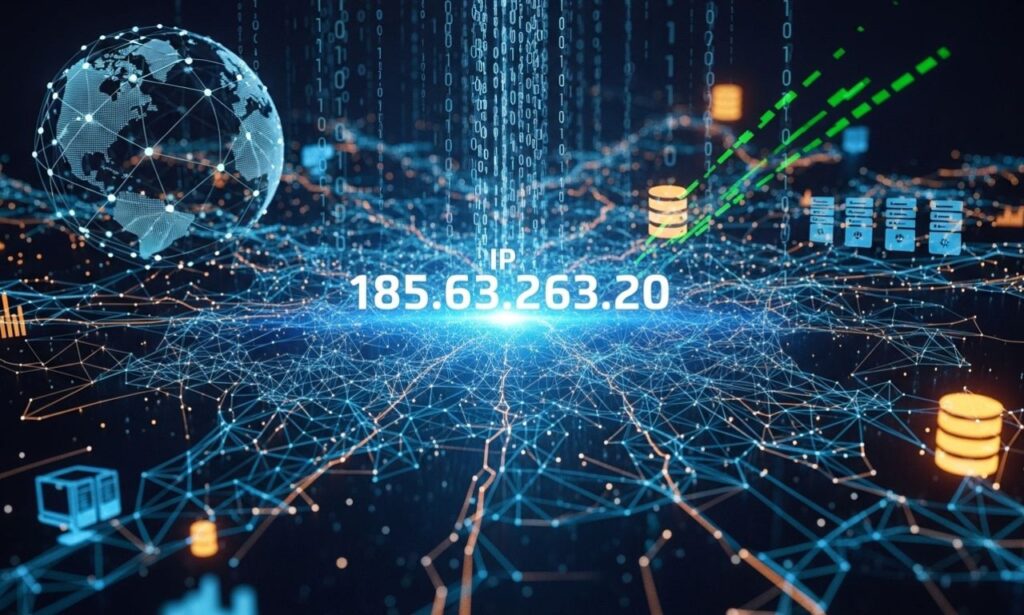In today’s digital landscape, understanding the intricacies of IP addresses is essential. They serve as unique identifiers for devices connected to the internet, playing a vital role in how we communicate and exchange data online. Among these numerical addresses lies 185.63.263.20—a sequence that piques curiosity and raises questions about its significance.
What does this address represent? Why is it important for users and businesses alike? As we delve into the world of IP addresses, you’ll discover how such seemingly simple numbers impact your online activities daily—shaping everything from web browsing to cybersecurity measures. Let’s embark on this journey to unravel the mysteries behind 185.63.263.20 and explore why every internet user should pay attention to their own IP address!
What is 185.63.263.20?
185.63.263.20 is an example of what’s known as an IP address, specifically in the IPv4 format. It serves as a unique identifier for devices on a network.
This particular string of numbers helps routers direct internet traffic efficiently, ensuring data packets reach their intended destinations without confusion.
Every device connected to the internet has its own IP address, allowing seamless communication between them.
In technical terms, 185.63.263.20 could represent anything from a personal computer to a server hosting websites or services.
Understanding this specific IP can provide insights into geographical locations and even the Internet Service Provider (ISP) behind it, painting a clearer picture of its role in digital interactions.
The Importance of Having a Unique IP Address
Having a unique IP address is crucial in today’s digital landscape. It serves as your online identity, distinguishing your device from millions of others connected to the internet. Without it, communication between devices would be chaotic.
A unique IP allows for reliable data exchange and seamless browsing experiences. When servers can pinpoint exactly where requests come from, they can efficiently deliver content tailored to each user. This personalization enhances user satisfaction.
Moreover, security is enhanced with a unique IP address. It helps in tracking malicious activities and identifying potential threats. Each device’s distinct signature plays a vital role in maintaining network integrity.
In an increasingly interconnected world, having an individual identifier ensures that you stay linked without interference or overlap with other users’ information. Unique IP addresses are foundational for everything we do online—from streaming movies to conducting financial transactions securely.
Personal vs Public IP Addresses
IP addresses come in two main types: personal and public. Understanding the difference between them is essential for anyone navigating the digital landscape.
Personal IP addresses are assigned to individual devices within a private network. These are often used in homes or small offices, allowing multiple devices to connect seamlessly while communicating with one another. Think of these as your home address—specific but not visible to outsiders.
Public IP addresses, on the other hand, serve as identifiers for whole networks on the internet. They enable different networks to communicate globally. When you access a website or send an email, it’s your public IP that interacts with external servers.
While your personal IP keeps things internal and secure, your public IP opens doors to the vast expanse of online interactions. It’s crucial for ensuring data reaches its intended destination without compromising security at home.
How to Find Your IP Address
Finding your IP address is a straightforward process. Whether you’re using a computer, smartphone, or tablet, the steps are fairly similar.
For Windows users, simply open the Command Prompt. Type “ipconfig” and hit enter. Your IP address will be displayed under the “IPv4 Address” section.
If you’re on a Mac, go to System Preferences and click on Network. Select your active connection from the list, and you’ll see your IP address listed there.
Smartphone users can find their addresses in settings as well. On Android devices, navigate to Settings > About Phone > Status. iPhone users can check by going to Settings > Wi-Fi and tapping on the network you’re connected to.
Additionally, many websites offer free services that display your public IP address right away—just search for “What is my IP?”
The Role of IP Addresses in Internet Communication and Data Exchange
IP addresses serve as the backbone of internet communication. Each device connected to a network requires an IP address to send and receive data.
When you visit a website, your request travels across various routes in the digital landscape. The source and destination are identified by their respective IP addresses. This ensures that information reaches its intended location without getting lost in transit.
Data exchange relies heavily on these numerical identifiers. They facilitate everything from email exchanges to streaming services and online gaming interactions. Without them, our virtual world would be chaotic.
Moreover, IP addresses enable network routing protocols to function efficiently. By employing specific algorithms, routers determine the best path for data packets based on their unique addresses.
As we engage more with technology daily, understanding this fundamental role becomes essential for navigating today’s interconnected environment seamlessly.
Security and Privacy Concerns with IP Addresses
Security and privacy are pressing issues when it comes to IP addresses. Every device connected to the internet has a unique identifier, making it easier for malicious actors to track online activities.
Hackers often exploit vulnerabilities linked to specific IP addresses. This can lead to unauthorized access or data breaches that compromise personal information.
Moreover, your IP address can reveal your approximate geographical location. This poses additional risks, particularly if someone wants to target you based on where you live.
Using a VPN is one way individuals safeguard their online presence by masking their true IP address. By routing traffic through different servers, users can maintain greater anonymity.
Understanding these concerns highlights the importance of staying vigilant about how and where you share your information online. Protecting your digital footprint has never been more critical in today’s interconnected world.
Future Implications of IPv6 on the Use of IP Addresses
The transition to IPv6 is a game changer for the digital landscape. With its enormous address space, it accommodates countless devices and users. As more gadgets connect to the internet, the limitations of IPv4 become painfully clear.
IPv6 not only increases availability but enhances security features as well. Built-in encryption protocols make data transmission safer. This could lead to greater trust in online transactions and communications.
Moreover, IPv6 supports advanced networking capabilities. Features like multicast addressing improve efficiency when sending data to multiple users simultaneously. This will be critical as streaming services continue to grow.
With IoT devices proliferating, adapting IPv6 becomes essential. The seamless integration of smart home tech relies on these extensive IP ranges for effective communication between devices.
As businesses evolve digitally, embracing IPv6 ensures they remain competitive and future-ready in an ever-expanding online environment.
Conclusion
Understanding the significance of IP addresses, particularly 185.63.263.20, sheds light on their essential role in our digital landscape. Each unique address facilitates communication and data exchange across the vast network of the internet.
The distinction between personal and public IP addresses further emphasizes how these numerical identifiers operate within different contexts, highlighting both individual privacy needs and broader connectivity requirements.
As we continue to evolve digitally, awareness of security and privacy concerns surrounding IP addresses becomes paramount. The ongoing transition to IPv6 promises to reshape the way we interact online, 185.63.263.20 presenting new opportunities for innovation while also requiring vigilance in safeguarding our information.
Recognizing how vital unique IPs are can deepen your understanding of the intricate web that connects us all—making it clear that each number holds a piece of this expansive puzzle.







